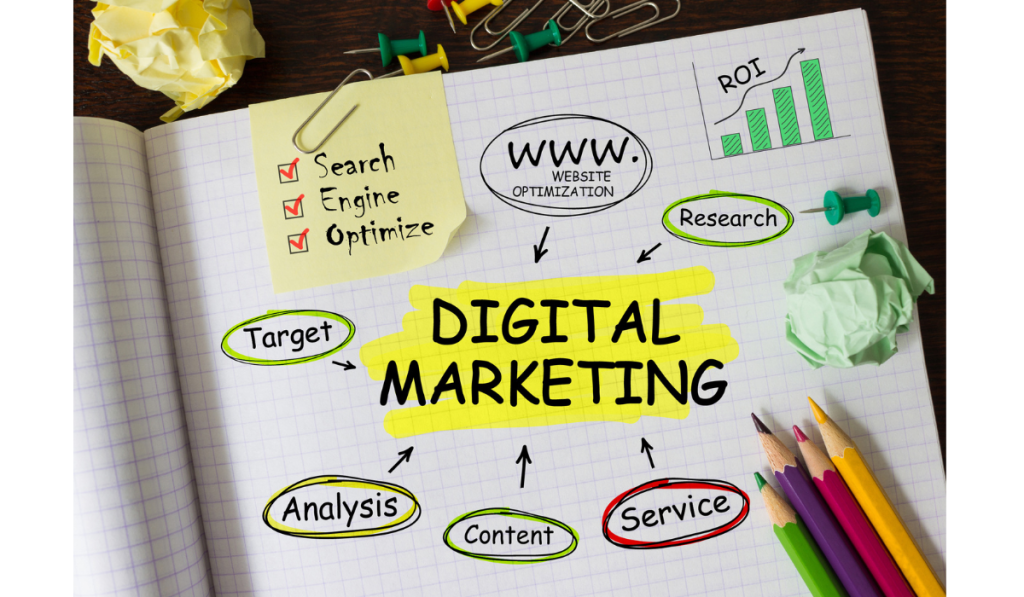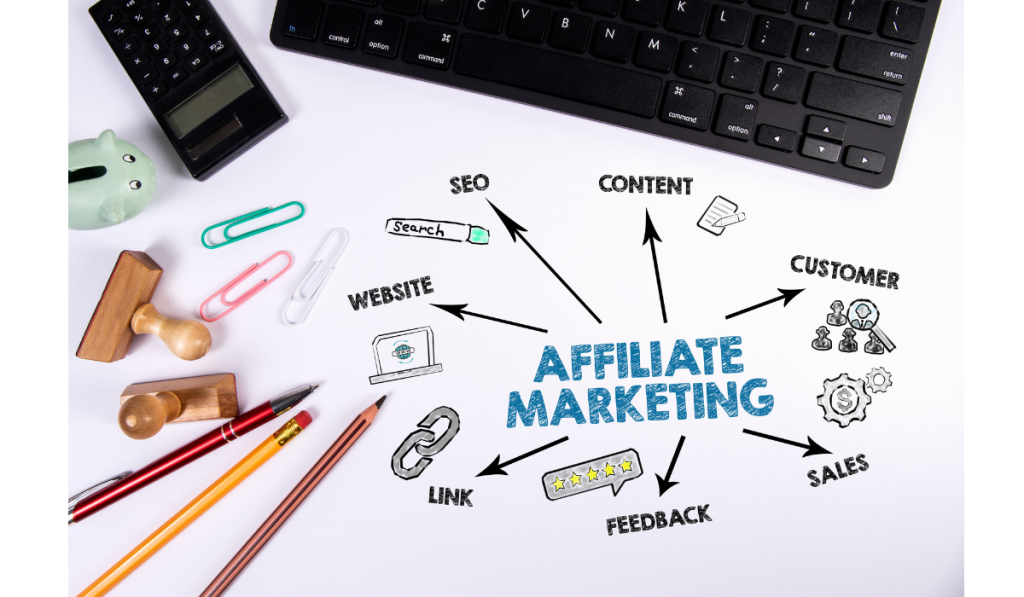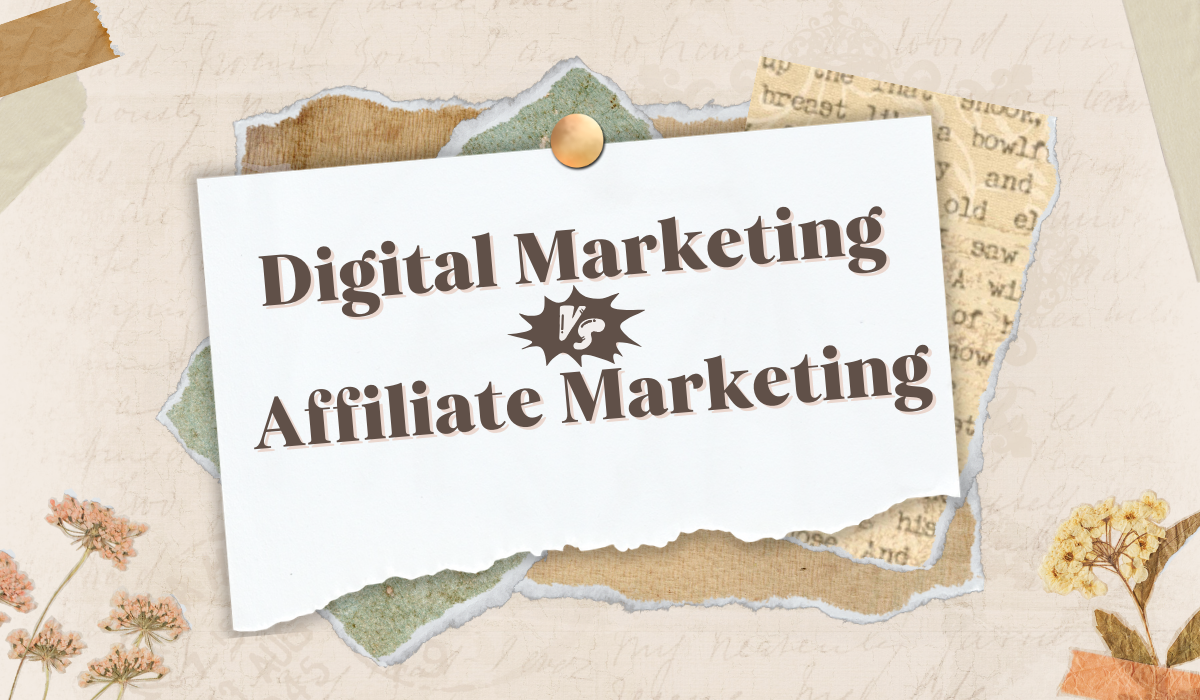Digital Marketing vs Affiliate Marketing
Modern marketing offers a wide assortment of options for businesses and individuals alike, with every choice having its perks and drawbacks. In this context, it is possible to identify two that are effective and commonly promoted: Digital Marketing and Affiliate Marketing. The strategies are not the same and their differences are important in determining which one might be best when it comes to a given objective you have in mind. In this article, we will focus on Digital Marketing and Affiliate Marketing specifically, compare both and highlight Strengths, weaknesses, opportunities and threats, and decide which one is suitable for you.
Quick Links
What is Digital Marketing?

Digital marketing can be explained as the act of marketing the products or service to the consumers using modes in the digital platform or in the net. This is a generic term that covers any process and strategies that are aimed at users on the internet with the ultimate aim of closing a sale or getting a conversion. Through the help of search engine, social media, mail, website, and mobile applications, digital marketing is capable of communicating with the customers.
The most important elements of Digital Marketing
Search Engine Optimization (SEO): SEO therefore refers to the process of making a website more recognized by different search engines of course with the prime one being Google. Search Engine Optimization involves; selection of keywords, optimization of web pages, developing fresh contents and acquiring relevant links. Originally, it is designed to get higher ranking in the organic search and therefore, lead to more visitors on the web site.
Content marketing: Content marketing is a technique that involves producing relevant and useful information for customers in an effort to attract them in and make the providers of these services seem better. It includes posts on social media and infographics, as well as web-based publications, blogs, videos, and podcasts.
Social Media Marketing: This strategy refers to the process of advertising products or services through social networks like; Facebook, Instagram, Linkedin, tweeter and now tik tok. This includes employing the use of social media tools, development of fresh content and paid content for the company to engage the target consumers.
Email Marketing: Email marketing is a direct communication technique that can be employed to pass on messages; offers; bulletins and updates to the customers. This is particularly helpful in relation to the leads and in regards to the relationships with the customer as well as to the second purchase.
Pay-Per-Click (PPC) Advertising: Another type of Internet marketing is PPC, where the advertisers pay per click of their ads. Some of the most common PPC include Google Ads, and social media ads. Precisely, PPC works because it takes the business to the target market within a short while since it is best for traffic and lead generation.
Influencer Marketing: In this approach, the brands are related to people with many friends on the available social media platform. Experts in a specified field recommend certain goods or services to their followers in exchange for a commission.
Affiliate Marketing: A part of digital marketing strategy, affiliate marketing entails outsourced marketing practice where a business rewards one or more affiliates for each conversion to a customer or client.
Benefits of Digital Marketing
Global Reach: Marketing via internet and computer opens up an organization to access vast markets across geographical and political divides, hence expansion to the international market.
Targeted Campaigns: There are many opportunities for targeting allowing businesses to send their messages to the right people, with the right kind of interests and the right sort of behavior.
Cost Efficiency: In terms of efficiency and affordability digital marketing is more effective opposed to other pro traditional forms of advertising like TV or print ads.
Measurable Results: Marketing technologies and measurement tools give insights into the digital campaigns such as key performance indicators, effectiveness, and real-time optimization.
Enhanced Customer Engagement: Digital marketing and advertising is a direct communication tool through social media, email, and other web relevant content hence increases brand recognition as well as customer satisfaction.
Issues we are facing in Digital Marketing
High Competition: Nowadays, there are millions of websites, and the majority of them belongs to different commercial companies, while consumers are the target of their activities. To stand out there is a need to work hard, think out of the box and have capital investment.
Constant Changes: In this case, it is important to remember that even the digital marketing trends, algorithms, and consumer preferences are not fixed. It is therefore important to continue to stay abreast of these changes so as to remain effective.
Time-Intensive: Digital marketing demands significant time and expertise for managing areas like content creation, SEO, and paid campaigns.
What is Affiliate Marketing?

Affiliate marketing is an effective advertising strategy where businesses partner with affiliates to generate traffic, leads, or sales. Affiliates, in this case, can be people, bloggers, instants, webmasters, and anybody who could market products or services. These get paid per every sale or action that is made through the affiliate links they post.
Several Important Affiliates which Makeup the Concept of Affiliate Marketing
Affiliates/Publishers: This is the type of client that demands a business’s products or services or the one that puts it out there for sale. Others popular methods of promotions include blogging, social networks like Facebook or twitter, YouTube, and emailing with affiliate links.
Merchants/Advertisers: It is the companies or organizations that manufacture and supply them into the market whether they are goods or services. They offer their affiliates a set of promotional tools, tracks and payments per each sold product or each lead.
Affiliate Networks: These are web applications that linked merchants and affiliates and provided tracking, reporting and payment services. Some of the popular affiliate networks are Amazon associates, ShareASale, and CJ affiliate.
Customers: The target clients who visit the affiliate sites or are introduced to the advertisements through the chosen promotional technique.The affiliate gets paid when the customer performs a targeted action, like buying a product.
Commission Structures: Affiliate advertising works under different commission types of structures that include the following.
Pay-Per-Sale (PPS): First, the commission varies depending on the affiliate’s participation and the agreed percentage is a percentage of the sale price.
Pay-Per-Click (PPC): Affiliates make money on a per click basis and so they don’t need actual sales to earn their commissions.
Pay-Per-Lead (PPL): Users build trust with affiliates and when they click ‘sign up for a newsletter’ then affiliates get paid.
Benefits of Affiliate Marketing
Low Cost of Entry: Affiliate marketing does not need much capital to start with which makes it suitable for home business and anyone willing to make passive income.
Performance-Based: Affiliates are paid based on the results they produce, and as a result, businesses can keep unnecessary expenses in check and pay only for tangible outcomes.
Scalability: It is easy to reach more consumers since affiliate marketing relies on using more affiliates, which means the ability of the business to grow without incurring much cost.
Access to New Audiences: The benefits of working with affiliates are that they can always alert businesses to a brand that they would otherwise not get exposure to through sales.
Flexibility: It gives the affiliates freedom in the product or service they want to sell and market so that they can match it to their focus and target market.
Issues with Affiliate Marketing
Limited Control Over Brand Messaging: This is because the various affiliates that have been brought on board cannot be controlled on how they market certain products.
Fraud and Quality Control Issues: Error due to affiliate marketing is possible such as click through fraud or other malicious activities that might harm a certain brand.
Dependence on Affiliates: In the affiliate marketing the success of the program is dictated by the quality as well as the commitment of the affiliate. Through such a system, one can notice how low-performing affiliates may influence the overall performance.
Commission Costs: Commissions differ with the quantity of sales completed and therefore are added together, which can make a dent on profit when sales are many.
Digital Marketing vs. Affiliate Marketing: Reasons for Divergence
Scope and Approach: Digital marketing encompasses various strategies directly controlled by an organization, while affiliate marketing is a performance-based approach where third parties promote products.
Cost Structure: Digital marketing sometimes entails initial capital for ads, tools, as well as content, unlike affiliate marketing that entails commission spending, which is related to the performance – minimizing the initial risks.
Control and Management: One of the advantages of digital marketing is that it helps companies retain ownership of their marketing initiatives and messages. Affiliate marketing on the other hand requires affiliates, which makes it difficult to control the quality and frequency of promotions.
Risk and Reward: This article explores some of the dangers of digital marketing namely, excessive spending, and wrong strategic choices. These risks however, are dealt with in affiliate marketing through a performance based system that also extends commissions to the affiliate.
Time Investment: Digital marketing, therefore, needs constant attention and regularity in the campaign management, optimization as well as content development. It also needs less supervision compared to other types of partnerships but also needs occasional check-ups on the affiliate’s performance.
Choosing the Right Strategy: What’s better? Digital Marketing or Affiliate Marketing?
The decision of going for digital marketing or affiliate marketing mostly depends upon the goals of the business, available resources and general market environment.
Digital Marketing: Suitable for; those organizations which seek a dominant market share; those that must control their marketing communication activities; and those organizations who possess the financial capacity to use a wide range of communication tools. Digital marketing is also appropriate for the long-term growth strategy and direct interaction with consumers as well.
Affiliate Marketing: Perfect for companies that are interested in an inexpensive promotion method that pays for the results. Many marketers assume that it is most effective for e-commerce businesses brands, new businesses, and those on a tight budgets seeking to utilize the partner’s network for sales.
Why using both of these strategies can have a significant impact
In the situation, it is also ideal for most businesses to adopt both the digital marketing and affiliate marketing approaches. Merging digital marketing’s audience control with affiliate marketing’s results-driven approach boosts traffic, sales, and brand presence.
Conclusion
Digital marketing and affiliate marketing are two concepts that have their own benefits and could be helpful in determining the success of your business. Affiliate marketing is different from digital marketing as the latter covers various channels and vast amounts of data whereas affiliate marketing is based on performance. Knowing these differences and their advantages and disadvantages will assist you in developing an optimal approach, or a combination of approaches to achieve certain objectives and how to grow your business effectively.
What Is WooCommerce Product Slider and Why Your Store Needs It
Why Do Product Images Matter So Much in Online Stores? When someone visits an online store the…
0 Comments9 Minutes
How to Streamline Your Customers’ Shopping Experience?
The goal for any online store is to make shopping as smooth as possible. When visitors move…
0 Comments8 Minutes
Strengthening Brand-Customer Relationships Through Gamified Loyalty Programs
Creating lasting connections with customers has become increasingly vital as the marketplace grows…
0 Comments6 Minutes
How to Use SEO and SEA Together in Search Engine Marketing
In digital marketing, search engine marketing (SEM) plays a critical role in improving online…
0 Comments10 Minutes
Content Marketing Growth Hacks: Real Shortcuts to Drive Traffic
Are you still lagging in content marketing? Sticking to these old strategies seems…
0 Comments10 Minutes
How to Build a Strong Local Following Using Social Media Marketing
In the days of likes, shares, and stories, local businesses have a golden opportunity to create…
0 Comments9 Minutes
Why WooCommerce is the Best Choice for Your Online Store?
WooCommerce stands out as a top option for anyone looking to build an online store. This platform…
0 Comments8 Minutes
How to Use AI-Powered SEO Tools for WordPress eCommerce
SEO is a critical factor in the success of any e-commerce WordPress store. As competition…
0 Comments11 Minutes








